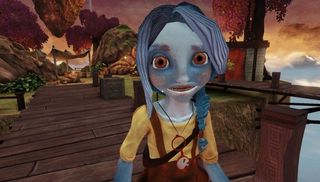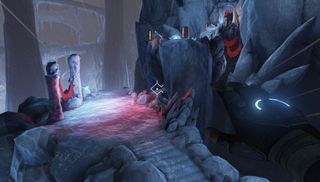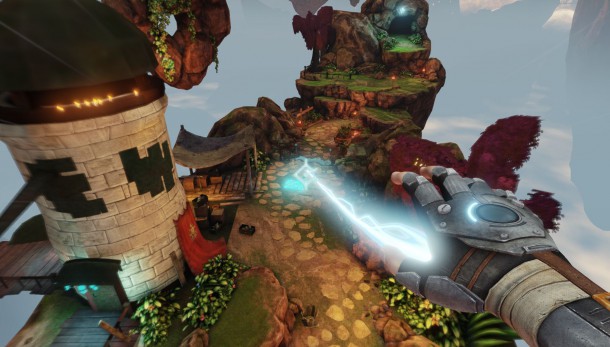Our Verdict
Fast, fluid and fun first-person platforming tied together with a warm narrative. Pace slows near the end, though.
PC Gamer's got your back
It's fitting A Story About My Uncle seems to have lept from the silver screen, given it's a game all about, well, leaping. There's a touch of the Percy Jackson or Inkhart about its story in which a young boy inherits a magical jumping glove from his explorer uncle and follows his trail through vast cloud cities, mystical mountain passes, and twinkling shrines. It's pure children's adventure fantasy.
Further into this non-violent, narrative-driven platformer you discover more fantastic gadgetry. Along with the glove that boosts you 20ft off the ground after releasing RMB there's a plasma grappling hook on LMB that latches onto any surface and whips you through the air, and space-bar-activated rocket boots to extend jumps in a blurry blast. The game's at its best when you're combining them—sprinting straight off sheer cliffs, tethering onto windmills, slingshotting around great floating balls of stone and rocketing skyward before you fall too far into the misty void below. It's some of the most tight and responsive first-person platforming I've ever played.
It works because you don't have to think about where to go—you just go. Glowing marks left by your uncle's grappling hook during his initial adventure serve as unobtrusive waypoints, and locations where you're meant to jump from are clearly designated by lights and wooden platforms. Confident level design inspires faith in it. Unlike, say, Mirror's Edge, you can fully commit, swan-diving into the unknown with arms pumping the air because, even if you can't quite see it yet, you know something's going to catch you. The more linear the section, the better - freedom comes in the air, not on the ground.

But you're not always airbound. In the game's best bit set in a pitch black cave, a massive yellow eye on a stalk scans around like a searchlight. If you move when the eyelids open it'll blast you into the darkness. It's a beautifully executed encounter, from the set-up in which your character says, “This tunnel doesn't look naturally formed - it looks...dug,” to the way the eye's brilliant light glints off metallic rock.
The game's peril revolves around unforced error—mistiming a jump or using the rocket boots at the wrong moment, for instance. This dust-up, albeit brief, introduces a different kind of threat, one that's actively trying to kill you. It's just a shame there aren't more enemies in the game, because Gone North clearly have it in them to design memorable ones.
Between platforming you'll explore sections of this fantastical realm at walking pace, discovering artifacts left by your uncle—lipstick marks on a post-it note, a telescope trained on the stars. Interacting with them triggers voiceover of the boy—now a man—recounting stories of his uncle to his daughter, Princess Bride style. One involves his uncle cultivating a handful of frogspawn then learning, upon discovering several angry red bites on his hand, they're actually mosquito eggs. This bedtime story motif is used well as a framing device.

But the game's roots are hard to trace—some airbrushed Hollywood production this is not. Take the voice acting, a curious blend of accents reading not-quite-right sentences. In an argument with her father, a lizard girl called Maddy remarks, “You want me to be like you, but I'll never be!” Regarding the eye monster, she says “I never imagined a creature sounding as terrifying.” Shouldn't that be 'so terrifying'?
There's something odd about the delivery, about the Walken-like way unexpected words are stressed, and this only emphasises the game's enigma. How long have these creatures lived down here? How are these rocks floating? What powers their skyships? You're left to ponder these questions, or else piece it together through items and journal entries. You did kinda just fall down a hole into a weird society of blue people, after all.
There's a subplot with one of them (your character likens her to a salamander, but the game calls them Strays). She wants to escape her life underground, so for a while she hops on your back and provides a bit of company. “Bet you can't make that jump without using the grappling hook,” she challenges at one point. While you're embarking on a boy's own adventure, she's on her own coming of age tale. These character arcs colour an already vibrant world.

It's not perfect, though. Later come crystals that rejuvenate your glove meter mid-jump, glossed surfaces that prevent grappling, and over-complicated routes. One dizzying path in a majestic ice cave spirals up a monumental shaft, crosses deep chasms and doubles back on itself numerous times. You spend more time searching for where to grapple than actually grappling, and death comes often. Such sections only slow the game's pace and suggest Gone North lack confidence in what's there already.
A Story About My Uncle is fast, fuid and fun. As a story it successfully springboards off traditional adventure fantasy and vaults off elsewhere. The two converge into a unique platformer with real heart.
Fast, fluid and fun first-person platforming tied together with a warm narrative. Pace slows near the end, though.

Riot has been slowly chipping away at build creativity in League of Legends, all in the name of balance, but there are better solutions

Deus Ex director Warren Spector thinks that 'if someone made Deus Ex today it might be perceived as a documentary,' so if he made a new one it would be pretty different

Today's Wordle answer for Sunday, November 10
